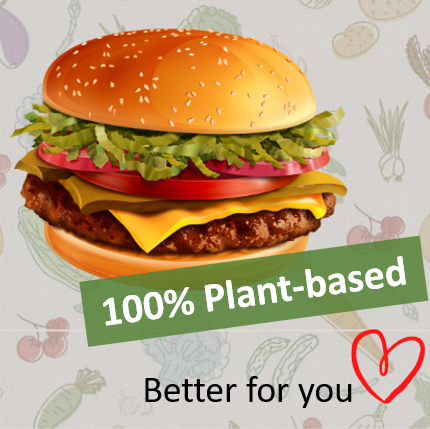Producers of meat alternatives and the media have been promoting plant-based products quite extensively. They say these products are healthier, better for the environment, and more appealing in taste and texture than animal meat.
Let’s look at some of the research around these nutrition and health claims.
Nutritionally, meat and meat alternatives are NOT the same
Strong evidence shows that plant proteins like legumes, soy and nuts are good for our health.

However, messages on the packaging of plant-based burgers like
“100% plant-based”
“Made from plants”
“Better for you”
may lead consumers to think that such processed products are just as healthy as fresh vegetables.
In fact, plant-based burgers rarely use fresh ingredients. What is more, they have less protein and more salt than beef burgers. And because they are often made with coconut or palm oil, they can be high in saturated fat.
Algae and insects are sustainable alternatives to meat. Nutritionally, however, they are not the same. Yes, they tend to be lower in fat. But they are also lower in protein. Algae and insects are also not usually eaten as the main part of a meal. They tend to be a snack, like roasted seaweed or insect protein bars. Or they can be a food ingredient (cricket flour), especially in Western contexts.
Cultured meat (i.e., meat grown from animal cells) may be very similar to animal meat nutritionally. However, it is not currently widely available.
There is a health halo around new alternative proteins
Newer meat alternatives might have a ‘health halo’. Consumers may think that these products have the same health benefits as fresh vegetables or other plant-based foods.
In addition, because of the positive environmental and sustainability messages around plant-based foods, consumers may think all meat alternatives are therefore also healthy.
A health halo is the perception that a food is good for you even with little/no evidence. (See Rachel and Florence’s previous post on Flexitarianism)
New products have much potential to benefit health
As science and technology advance, there is growing potential for new foods to be healthier than existing foods. For instance, future protein products can be formulated to be lower in fat and higher in protein, fibre, vitamins and minerals than meat.

We need better evidence
There is a lot of marketing around the health benefits of new meat alternatives. However, the effects of plant-based meats, insects, algae and cultured meat on our long-term health have not been well studied.
The best way to know how these products impact our health is to have more nutrition studies which
- follow large groups of people,
- are longer in duration, and
- are conducted under controlled conditions.
Only then can we start to decipher the health halo and know for sure if new meat alternatives live up to all the hype.
This post is Part 1 of a series on why consumers choose meat alternatives. Watch our blog space for more.
Read why consumers choose alternative proteins: Tso/Forde. (2020). A Critical Appraisal of the Evidence Supporting Consumer Motivations for Alternative Proteins https://www.mdpi.com/2304-8158/10/1/24
Rachel Tso, 3 Dec 2021

